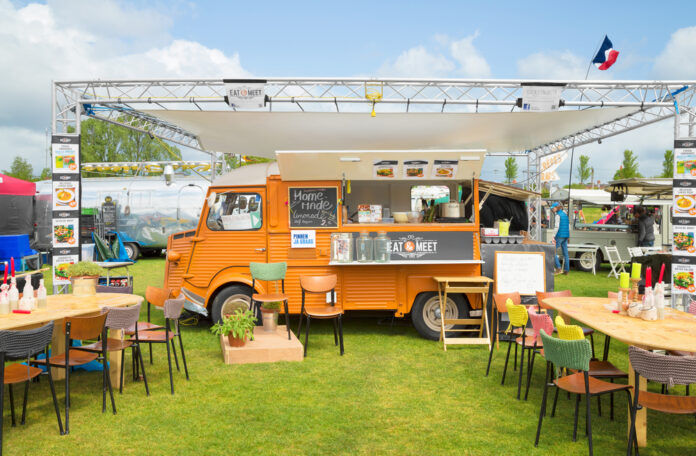Are you captivated by the aroma of sizzling street food and the thrill of serving up culinary delights? Then ditch the brick-and-mortar dream for a minute and consider the exciting world of food carts! Owning a food cart offers a unique blend of creativity, freedom, and delicious potential. But before you dive headfirst into fryer grease (figuratively speaking), let’s navigate the essential steps to transform your food cart dream into a reality.
How Much Does It Cost to Open a Food Cart?
The beauty of a food cart business lies in its affordability compared to traditional restaurants. Startup costs can range anywhere from $5,000 to $30,000, depending on various factors. These include:
- The Cart Itself: Will you purchase a used cart, build your own DIY masterpiece, or get a custom-made beauty? Each option has its own price tag. Here’s a breakdown:
- Used Carts: A budget-friendly option, ranging from $5,000 to $15,000. Be sure to factor in potential repairs and renovations.
- DIY Carts: Perfect for the handy foodie! Costs can vary depending on materials and complexity but expect to spend at least $5,000 on tools and supplies.
- Custom Carts: The ultimate in personalization, but also the priciest option. Expect a starting price of $15,000 and upwards, depending on size, features, and design.
- Permits and Licenses: Food safety is paramount, so factor in the cost of obtaining health permits (typically around $1,000), business licenses (around $500), and vendor permits for your chosen location (costs vary by city).
- Equipment Essentials: Grills, refrigerators, freezers, display cases, and even customized fries boxes with your logo (because presentation matters) all contribute to the initial investment. Research used equipment to save money, but prioritize functionality and safety.
Selling on the Streets: Turning Passion into Profit
So, you’ve got your cart and your permits. Now comes the fun part: crafting a menu that tantalizes taste buds and sets you apart from the competition. Here are some key ingredients for success:
- Concept is King: Don’t be a jack-of-all-trades, master of none. Focus on a specific cuisine or dish that you can perfect. Think gourmet tacos, international fusion flavors, or decadent desserts.
- Price it Right: Research your competition and local demographics to create a menu that’s both delicious and affordable. Offer a variety of price points to cater to different budgets.
- Location, Location, Location: Find a high-traffic area with hungry customers – think office districts, parks, or popular events. Negotiate with property owners or event organizers for permission to set up your cart. Consider weekends and evenings when foot traffic is typically higher.
DIY or Buy? Building Your Food Cart Empire
There’s a sense of accomplishment that comes with building your own cart. However, it requires carpentry skills, knowledge of food safety regulations, and access to proper tools and workspace. Alternatively, purchasing a used cart offers a quicker and sometimes more affordable option. But the ultimate champion? A custom-made cart that perfectly reflects your brand and functionality needs. Look for cart builders who specialize in food service vehicles, ensuring proper ventilation, plumbing, and electrical systems.
Opening Your Food Cart: The Final Steps
Once you have the logistics in place, it’s time to spread the word! Utilize social media to build anticipation with mouthwatering photos and videos of your menu items. Design eye-catching signage for your cart that reflects your brand and use bright colors to attract attention. Consider offering loyalty programs through apps or punch cards to keep customers coming back for more. Remember, a friendly smile and excellent customer service are just as important as the food itself. Train yourself and any staff on food safety protocols and customer interaction to ensure a positive dining experience.
Is a Food Cart Business Right for You?
While the freedom and affordability are enticing, owning a food cart business requires dedication and hard work. Long hours, unpredictable weather, and the constant hustle are all part of the package. You’ll need to be prepared for early mornings spent prepping ingredients, late nights cleaning up, and the ever-present possibility of equipment malfunctions. But for those passionate about food and serving their community, the rewards can be immense. The satisfaction of seeing happy customers devour your creations and the flexibility to be your own business are just a taste of the success you can achieve.
Conclusion
So, is a food cart the first course of your entrepreneurial feast? The answer lies within your passion and dedication. While challenges exist, the world of street food offers immense opportunities. With a well-defined plan, a mouthwatering menu, and a commitment to exceptional service, your food cart can become a mobile beacon of culinary delight. Remember, the journey from passionate cook to street food king (or queen) begins with that first step. So, grab your spatula, fire up your creativity, and get ready to dish out delicious success.

